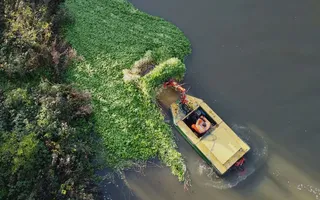Our annual summer programme to tackle the weed across our 2,000 miles of waterways is well underway – with volunteers, staff and contractors working to remove the weed before it clogs up canals and destroys native wildlife. Over the coming months we will need to invest over £1.1 million to remove more than 2,500 tonnes* of invasive weed – equivalent to 14.5 blue whales.
Causing problems for boats
Aquatic weeds like duckweed, floating pennywort and azolla grow extremely quickly. Azolla can double in size every three days, while some of the fastest-growing weeds can double in size within a matter of hours. Left unchecked, the weed causes problems for boats, rowers and anglers. It starves water plants of light, sucks up the oxygen fish need to breathe and, in turn, is damaging to much-loved species such as kingfishers and otters.
Warmer summers are increasing the growing months for invasive aquatic weeds, causing canals, rivers, ponds and pools to turn a vibrant shade of green. Forming a mat across the surface of the water, the weed accumulates unsightly litter and, while not directly harmful, people, dogs and other animals have been known to mistake it for grass and ended up in the water.
Climate change
The proliferation of weed in summer isn't new, but the hotter weather and fiercer storms that are becoming more common as a result of climate change are making the problem worse. Weed likes high temperatures, along with plenty of rain that washes nutrients from the surrounding area into the waterways – with the recent weather providing ideal spreading conditions.
Physically removing the weed is the quickest way to deal with the phenomenon, and our teams, contractors and volunteers across England and Wales have launched a fleet of boats to scoop up the weed and take it out of the water.
Challenging times
Julie Sharman, our chief operating officer says: “The changing climate, with hotter summers becoming more common, is making this natural phenomenon even more of a challenge. The weed isn't harmful, but it looks unappealing and is often studded with the litter that gets blown into the water from the streets. Our canals and rivers are wonderful places to visit, and are especially popular in summer, so it's important to keep them looking their best.
“A recent decision by government to cut future funding for the nation's canal network is going to make winning our battle against aquatic weed even harder. We run regular volunteer parties where people can get involved in all sorts of tasks to care for their local waterway, including removing weed, and we'd welcome any help in keeping our canals alive.”




